As the summer subsides and the back-to-school mood takes over, Keir Starmer must be wondering what happened to the holidays. Intensive Ukraine diplomacy followed weeks of protests at migrant hotels – culminating, with Tuesday’s Epping court judgment, in the unravelling of the Government’s asylum policy.
Meanwhile, Rachel Reeves is very publicly casting round for ways to extract yet more money from hard-pressed taxpayers in her autumn Budget.
If anyone needs the fresh start a new season can bring, it is Starmer and his beleaguered party. My poll finds a huge majority of voters saying they are pessimistic for the future of the country, including nearly two thirds of those who backed Labour last year.
The party’s already underwhelming lead on economic management has narrowed dramatically as inflation creeps back up and extra taxes and regulations hurt jobs and growth.
Only half of last year’s Labour voters think this Government is any better than the last one, and people are as likely as not to think Starmer will be gone by this time next year – an extraordinary position for a PM who walked into No 10 only last July with a majority of 174.
Voters increasingly complain that Starmer seems incapable of using that majority to do anything useful.
Asked what subject he would teach if he were in the classroom, participants in my latest focus groups said ‘something vague and indistinct that doesn’t really make a difference’.
His challenge for the new term, then, is to demonstrate some grip on the problems that he was all too ready to identify in opposition.
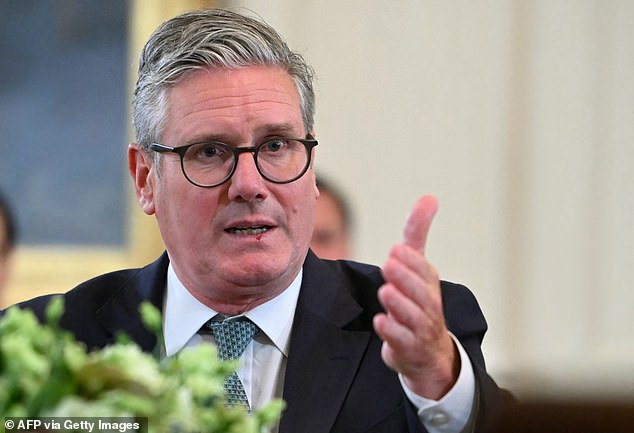
Sir Keir Starmer speaks during a meeting with European leaders in the East Room of the White House in Washington on August 18
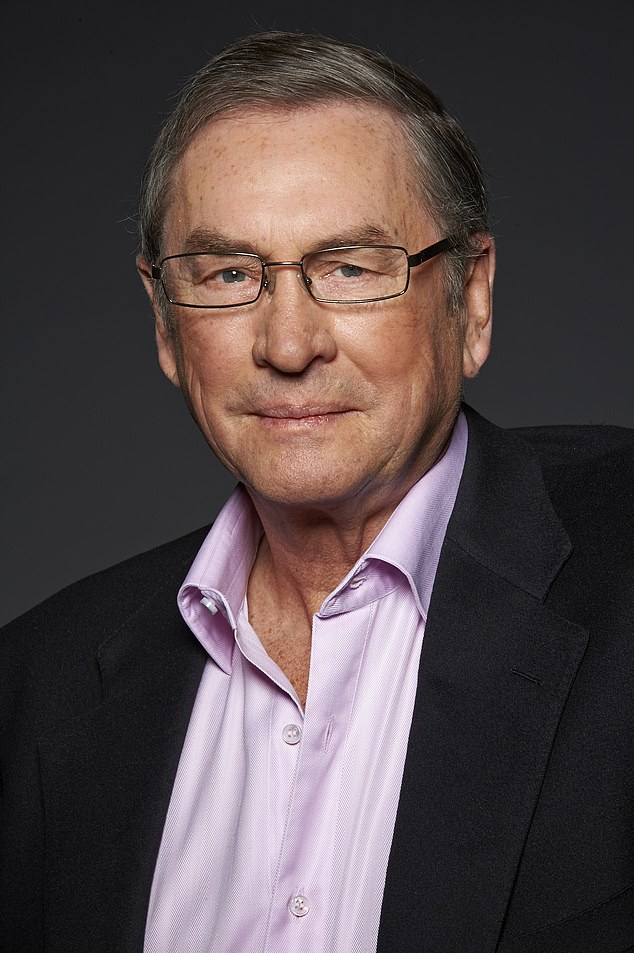
A poll by Lord Ashcroft (pictured) has found a huge majority of voters say they are pessimistic for the future of the country
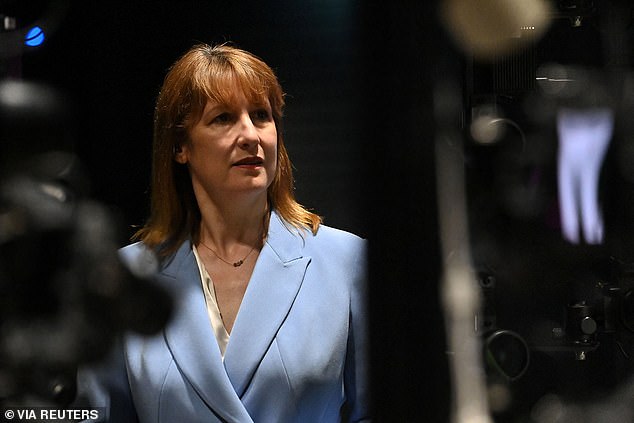
Rachel Reeves is seen during a visit Studio Ulster in Belfast, Northern Ireland, on August 12
Otherwise, he faces a mirror image of the electoral dynamic that did for the Tories, with Labour’s vote splintering in two or more directions – either to Reform UK or to Left-wing options such as the Lib Dems, the Greens and the as-yet-unnamed Corbynista alternative.
But so far, instead of displaying the sense of mission that a party needs to galvanise its base and keep waverers on board, Starmer has cultivated an unhappy knack for displeasing most of the people most of the time.
On winter fuel cuts and welfare reform he caved in to backbench pressure, earning both derision for the U-turn and fury for having proposed them in the first place. He has imposed tens of billions in extra taxes with no discernible improvement in public services (‘Where are they spending the money? Where’s it all going?’ demanded another of our participants last week – a 2024 Labour voter, as it happens).
He has even pulled off the same trick with his pledge to recognise a Palestinian state – horrifying some by rewarding Hamas terrorists and hostage-takers while at the same time failing to impress British Muslims, many of whom see the move as a cynical ploy to secure their votes.
Nowhere has this ineffectualness been more damaging than in the field of immigration. Here Starmer has somehow contrived to get himself accused by the Left of invoking Enoch Powell while presiding over record levels of illegal migration.
The news that small-boat arrivals have passed 50,000 since Labour took office has helped make the issue people’s top priority: half of all voters name it among their top three concerns, ahead of the cost of living and the NHS.
In my research, many (again, including many Labour voters) saw the migrant hotel protests not just as a reaction to crimes allegedly committed by some of their residents, but as the inevitable result of ignoring ordinary people for too long: ‘You’ve got people who can’t afford a house, and these people come across the Channel illegally and they’re being put in four-star hotels and given money, and they wonder why people are upset about it,’ as another participant put it.
What infuriates them further is the suggestion that protesters are simply far-Right troublemakers. This, as much as the issue itself, is what makes the broken asylum system such an open goal for Nigel Farage.
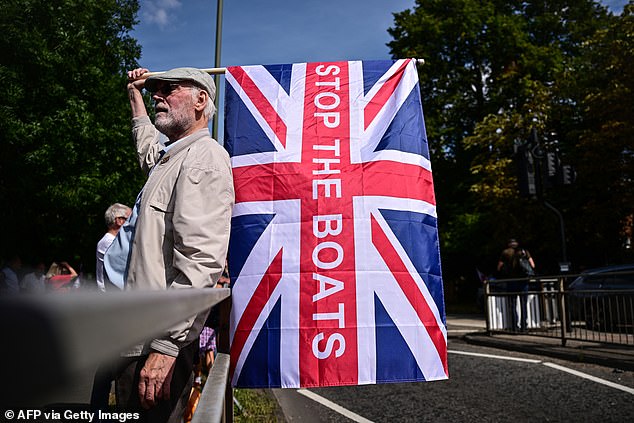
An anti-immigrant protester holds a Union Flag reading ‘Stop The Boats’ during a protest outside the Sheraton Four Points hotel on Saturday
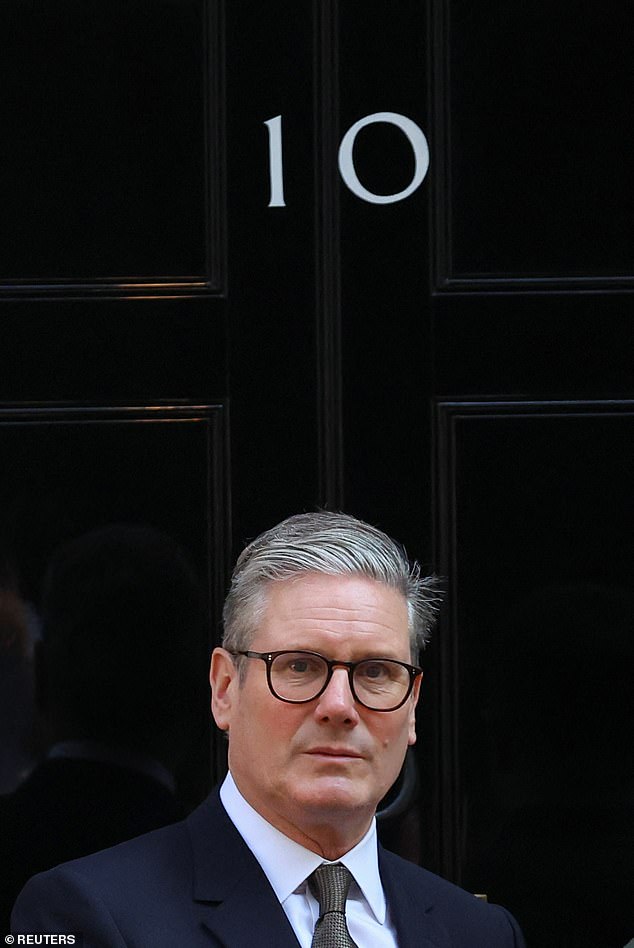
British Prime Minister Keir Starmer stands outside Number 10 Downing Street on July 19 last year
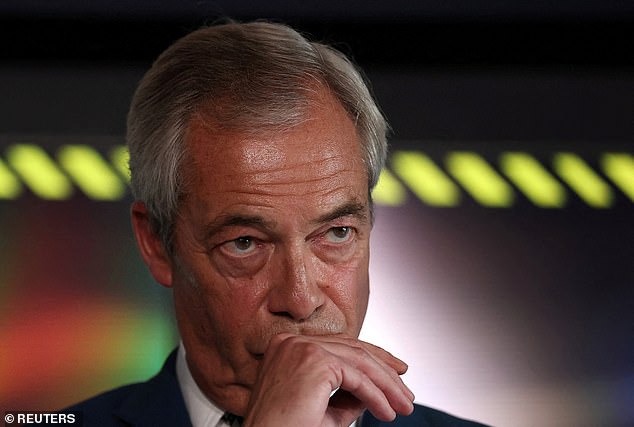
Britain’s Reform UK Party leader Nigel Farage reacts at a news conference in London on August 4
When it comes to Reform UK there are three kinds of people. The biggest single chunk (though a minority overall) thinks the party is a bad influence and wishes it would go away.
Another slice likes what Reform stands for and might well vote for it.
In the middle – around one in five of all voters – are those who currently wouldn’t vote Reform but are glad it exists because it says things that need saying.
These people think Reform serves the useful purpose of keeping pressure on the established parties to deal with issues they would rather ignore. They also – if Farage plays his cards right – represent the next round of potential converts to his voting coalition.
What Reform supporters like best about the party, they say, is that it puts Britain first and stands up for common sense and free speech. Nine in ten of them name immigration among their top concerns. They are more committed to their party than their Tory and Labour counterparts.
What, then, stops the ‘glad they’re around’ group from going all-in for Reform? The single biggest factor, I found, is doubt that they are ready to run the country. Much as these voters care about immigration, they are not sure how Reform would handle public services and the economy.
They wonder if their policies really add up. They think Farage lacks an experienced team (‘Who would be his chancellor? Who would be his foreign secretary?’ as one participant asked). And there are lingering worries that racist elements cling to the party.
These are the challenges that face Farage as he prepares for the Reform conference next month, the first of the new political season. Compared to Labour (who have to show that they have a purpose), the Conservatives (who have to show that they’re relevant) and the Liberal Democrats (who have to remind people that they exist at all), working out how to extend his party’s lead in the polls is a nice problem for him to have.
- Lord Ashcroft is a businessman, philanthropist, author and pollster. His research is at LordAshcroftPolls.com.











